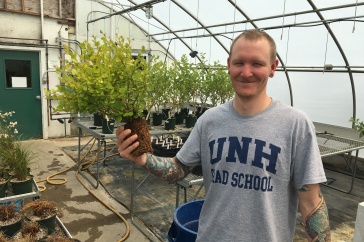
It’s a Friday afternoon in early December, and David Finkelhor, director of the Crimes against Children Research Center (CCRC) at UNH, is having a rare moment of rest in his office. Just back from Germany and Tanzania, where he met with policymakers about preventing sexual abuse and child victimization, Finkelhor is set to venture abroad again the following week. For now, though, he’s reflecting on the center’s research — how it’s evolved, how far it’s traveled and how much is left to do.
The CCRC was created in 1998 as an extension of the work begun in the university’s Family Research Laboratory in 1975 by Murray A. Straus. In those early days, the center’s research was in an advocacy phase, according to Finkelhor. “It was a matter of trying to persuade people family violence and child victimization were problems that needed some kind of action,” says Finkelhor ’78G, a professor of sociology and co-director of the Family Research Laboratory. “Now we’ve transitioned to an efficacy phase. We’ve gotten consensus that something needs to be done about violence against children and we’re trying to establish what works.”

That means the CCRC’s ongoing research efforts, including pioneering national surveys like the National Survey of Children’s Exposure to Violence, continue alongside research about the impact of new technology and the benefits of prevention education programs in the U.S. and around the world.
And as the risks facing children and teens evolve, so does CCRC’s agenda. The center recently released a study about “sextortion,” a crime in which young people are threatened or coerced into providing sexual images on the internet. Another study underway focuses on doing a better job of monitoring children’s exposure to firearms and firearm safety.
CCRC research has had real-world impact. In 2010, U.S. Attorney General Eric Holder launched the Defending Childhood initiative, a Justice Department-backed effort to reduce the exposure of children to violence as victims and witnesses. That program was specifically based on CCRC findings, Finkelhor says. The federal Centers for Disease Control also relied on the CCRC in developing its Adverse Childhood 188体育app_188体育在线-平台官网s initiative, which aims to use evidence-based treatments to improve conditions for children who are being victimized.
The center also works with the Internet Crimes Against Children Task Force, a Department of Justice-funded national network of law enforcement agencies. The task force uses CCRC research “to train the people who train law enforcement” to respond to, track and prevent internet crimes against children, Finkelhor says. CCRC researchers also present findings and lead workshops for law enforcement officers. If a police officer or prosecutor is investigating a case involving online child victimization, there’s a good chance their training included CCRC-produced research.
“We see ourselves as providing direct consultation to journalists and policymakers, but we also publish for scholars and the general public,” Finkelhor says.
The center’s mission extends to training the next generation of researchers. Yahayra Michel-Smith ’17G has been a research assistant with CCRC for six years and is currently working on her doctoral dissertation on the topic of poly-victimization — youth who experience multiple types of different offenses in a short period of time. For Michel-Smith, Finkelhor and other researchers at CCRC are generous with their time and knowledge.

In 1968, professor of sociology Murray Straus launched what would become groundbreaking research on family violence and corporal punishment that changed theories on childhood discipline nationally. A prolific scholar who authored 15 books and hundreds of scholarly articles, Straus died in May 2016 at age 89.
“Specifically as a result of Dr. Finkelhor’s and Dr. Straus’s mentorship, I’ve been to Sweden to present my research and I went to Israel for a workshop,” she says. “I cannot imagine those amazing things happening if they hadn’t been my mentors.”
Reeve Kennedy ’18G agrees. “It’s a supportive environment, and they want to help students and they want students to work with them,” she says.
Plenty of challenges remain, according to Finkelhor. There are the practical matters of research — responding to rapid changes in technology, finding sources of funding — as well as more abstract challenges. He points to an increased public policy focus on rising healthcare costs. There’s a link between preventing violence against children and keeping healthcare costs down, Finkelhor says, but illustrating that connection isn’t easy. “One of the things we’re trying to tap into is how, through our research programs, we can show the relevance of what we’re doing to larger social policy objectives.”
Even though much has changed since Straus and Finkelhor began their groundbreaking work more than four decades ago, CCRC’s mission — and impact — remains the same. The center continues to shine a light on difficult subjects and, through its research, advocate for the safety of children around the world.
“They’re looking at a lot of uncomfortable issues and things people might not want to talk about,” Kennedy says. “Bringing awareness to that is important.”
?
?
-
Written By:
Larry Clow '12G | UNH Cooperative Extension



















































